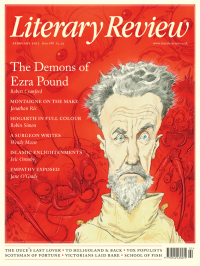Marek Kohn
Meme Streak
From Bacteria to Bach and Back: The Evolution of Minds
By Daniel C Dennett
Allen Lane 496pp £25
Daniel Dennett has decided that the mind is less like a computer than he had previously imagined. Instead, the Darwinian philosopher suspects that the brain may be even more Darwinian than he had supposed. The constituent elements of a computer have no individual interests and are not in competition. They encounter no risks or opportunities. Brains, however, are made up of basic elements, neurons, the distant ancestors of which were free-living cells. Dennett speculates that neurons may retain traces of their ancient ancestral spirit, inducing them to compete with each other for resources. This competition feeds upon the opportunities provided by the constant influx of virus-like information entities known as memes. These themselves exploit the opportunities that the marketplace of the brain affords to replicate and spread to other minds.
Dennett’s notion of ‘feral neurons’ is eye-catching and rather thrilling, but its value is hard to specify. It signals that he is continuing to have ideas (though this one was first aired several years ago) and that he is capable of changing his mind. It humanises the idea of the

Sign Up to our newsletter
Receive free articles, highlights from the archive, news, details of prizes, and much more.@Lit_Review
Follow Literary Review on Twitter
Twitter Feed
In 1524, hundreds of thousands of peasants across Germany took up arms against their social superiors.
Peter Marshall investigates the causes and consequences of the German Peasants’ War, the largest uprising in Europe before the French Revolution.
Peter Marshall - Down with the Ox Tax!
Peter Marshall: Down with the Ox Tax! - Summer of Fire and Blood: The German Peasants’ War by Lyndal Roper
literaryreview.co.uk
The Soviet double agent Oleg Gordievsky, who died yesterday, reviewed many books on Russia & spying for our pages. As he lived under threat of assassination, books had to be sent to him under ever-changing pseudonyms. Here are a selection of his pieces:
Literary Review - For People Who Devour Books
Book reviews by Oleg Gordievsky
literaryreview.co.uk
The Soviet Union might seem the last place that the art duo Gilbert & George would achieve success. Yet as the communist regime collapsed, that’s precisely what happened.
@StephenSmithWDS wonders how two East End gadflies infiltrated the Eastern Bloc.
Stephen Smith - From Russia with Lucre
Stephen Smith: From Russia with Lucre - Gilbert & George and the Communists by James Birch
literaryreview.co.uk